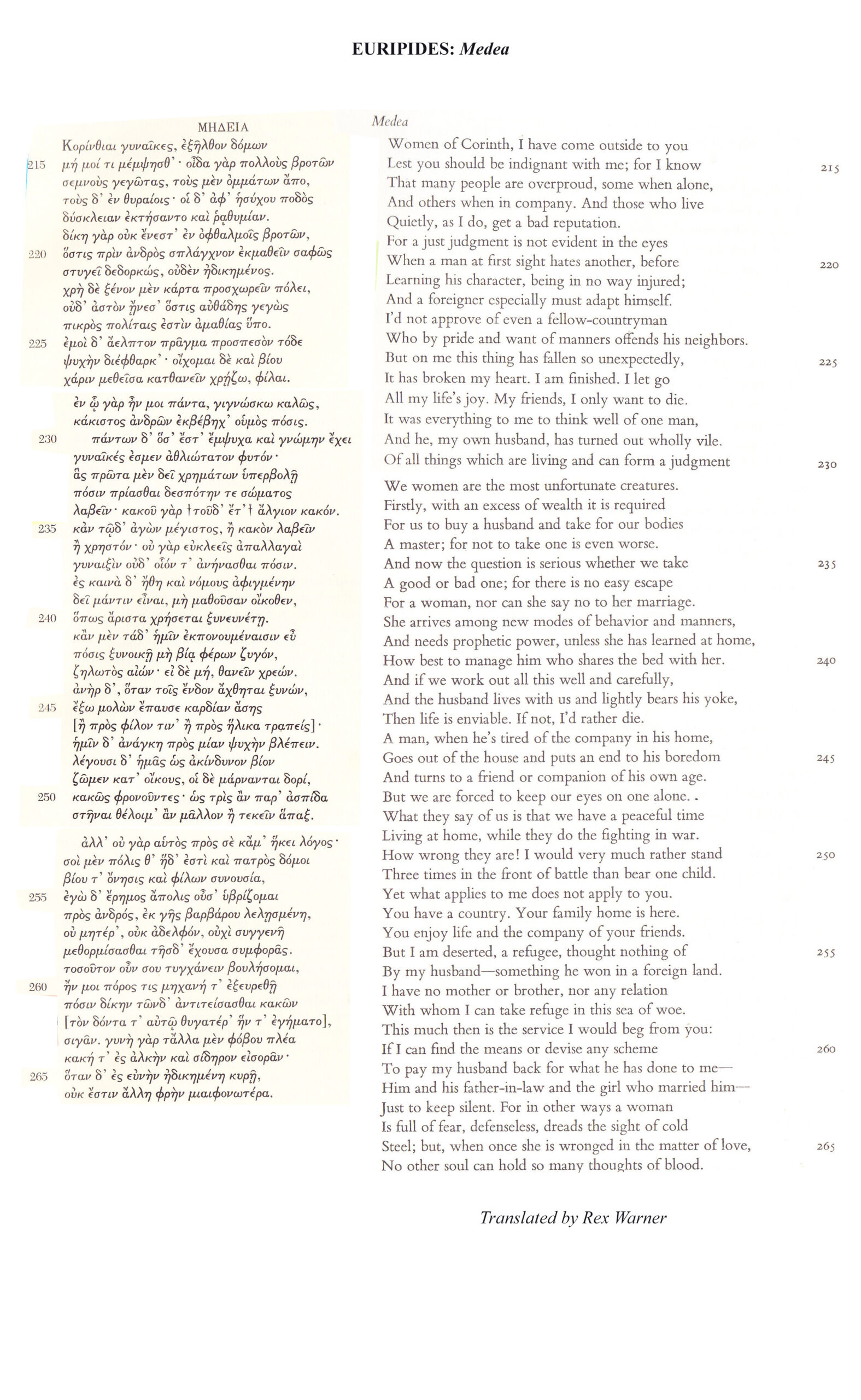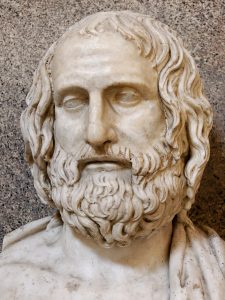Mythological Background
When Jason and the Argonauts reached the land of Colchis in their search for the Golden Fleece, they received help to acquire it from Medea, the sorceress daughter of King Aeëtes of Colchis. Part of this help came from Medea’s murder of her younger brother Apsyrtus to distract their father’s hunt for the escaping Argonauts. Once back in Jason’s homeland of Iolcos, Medea took revenge on Jason’s uncle, King Pelias, who had stolen the throne from Jason’s father: she tricked Pelias’ daughters into unintentionally killing their father. Because of this, Medea and Jason were banished from Iolcos, so they took refuge in Corinth. They had two sons and lived happily in Corinth for a time. But Jason decided he wanted to improve his social position, so he made arrangements to marry Creusa, the daughter of King Creon of Corinth. In fear of Medea’s possible vengeance, Creon ordered her and her children banished from Corinth.
Medea took her revenge on Creon by sending a poisoned robe and crown to Creusa. When Creusa put them on, they caught fire. Creon tried to pull the garments off Creusa, but she and he were burned to death. Medea then killed her children in front of Jason, and escaped from Corinth with their bodies in a magic chariot pulled by a winged serpent.
Listen to the Poem in English
Read by Linda Thompson
Reada

Notes
In lines 214-266, Medea speaks to the Chorus of Corinthian women about the injustices that women face, and about the difficulties in her own particular plight as a defenseless foreigner.
In the play, Jason is portrayed as callous and vain, so there is no reason to feel pity for him. It is not clear, however, what attitude Euripides wanted his audience to take toward Medea. In the first part of the play, Medea appeals to the Chorus of Corinthian women, asking for their sympathy for her situation, since she is (1) a woman, and therefore a helpless victim, and (2) an exile who has no kinfolk in Corinth to aid her. When Jason later rebukes Medea for getting herself banished because she earlier spoke ill of Creon and Creusa, Euripides depicts him as putting his own advantage above any obligation he might have to Medea for saving him in Colchis or any regard to the sacred oaths that Jason made to protect Medea. There is frequent reference in the play to the gods Zeus and Themis, who are the enforcers of oaths, which suggests that Euripides sees Jason as being as guilty as Medea is because he intends to break his sacred oath to her.
About the Author

There is little reliable evidence about the life of Euripides, and nearly nothing from his lifetime. Most ancient sources about his life say that he was born in the year when Athens won the Battle of Salamis, 480 BCE. He presented his first tragedies in 455, and won his first victory in a drama competition in 441. He won only four victories in drama competitions during his career as a playwright. Contemporary comic playwrights (Aristophanes and others) parodied and ridiculed his work more than they did the work of any other Athenian literary figure. This suggests that, although Euripides may not have won often, people paid attention to his work. We know he died before January of 405, because Aristophanes’ comedy, The Frogs, which refers to Euripides’ death, was staged in that month and year.
Evidence about Euripides’ activity as a tragedian is reliable: for the dramatic contests each year, an inscription in stone recorded the contestants’ names, their plays, and any prizes they won. The inscriptions were copied, most notably by Aristotle and his students, then later by the Alexandrian scholars. The Alexandrians also collected copies of as many plays as they could find, compiling them into collections later used by medieval copyists. Alexandrian scholars apparently had copies of 78 plays by Euripides, 70 tragedies and 8 satyr plays, and knew titles for 14 more plays. 19 of these plays survive; one play attributed to him the Rhesus, may not be his work. At least two non-dramatic poems are ascribed to Euripides: a victory ode (now fragmentary) in honor of Alcibiades’ victories in the 416 BCE Olympic Games’ chariot races, and an epitaph in honor of the Athenians who died in Sicily during the Peloponnesian War.
Evidence from Aristotle’s reference to a lawsuit in which Euripides was involved indicates that the poet was fairly well-off in terms of wealth – not surprising in that he had enough time available to him to be able to write plays without any guarantee of financial success from them.
A remark attributed to Euripides’ fellow writer of tragedies, Sophocles, reflects the difference between Sophocles’ work and Euripides’: Sophocles is said to have claimed that he showed people as they ought to be (or ought to be shown), whereas Euripides showed them as they really were. Euripides treated the old myths, his source materials for his plots, as if they were stories about real everyday people. Often in his plays he depicts his characters at their crisis moments, revealing their weaknesses.
A recurrent element in Euripides’ dramas is a sense of defeat and disappointment, possibly reflecting Euripides’ own feelings at the reception of his plays. He tended to focus on the weak and oppressed, the despised and misunderstood members of society: usually women, slaves, captives, strangers, and (to Greek eyes) barbarians (i.e., non-Greeks). Thus, another recurrent motif in Euripides is that of a character’s desire to escape his/ her situation. Euripides had his faults in constructing tragedies: scenes of pathos sometimes turn into scenes of sentimentality; his plays show signs of hasty or sloppy composition; and he sometimes attempted to get too much into a single character or situation. Faulty as his plays might be, however, his characters are unforgettable.
Although various reasons are given for Euripides’ decision to go to Macedon in 408 BCE, it is a guess as to which reason – his wife’s infidelity, his annoyance at having to compete against inferior poets, disdain for failing to win first prize in dramatic contests – is the true one. It should be noted that other Athenian poets and artists also accepted invitations from Archelaus, the archon of Macedon, at around the time Euripides went there. Whether Euripides was going into self-imposed exile, or intended to make only a temporary visit, is unknown. In any event, he died in Macedon. The funerary inscription on the cenotaph erected to him in Athens states that he was buried in Macedon.
Source
Euripides. Euripides I: Iphigeneia at Aulis, Rhesus, Hecuba, Daughters of Troy, Helen. Transl. A.S. Way. Loeb Classical Library. Cambridge, MA: Harvard University Press, 1987.
Image: Bust of Euripides. Marble, Roman copy after a Greek original from ca. 330 BC, Museo Pio-Clementino, Sala delle Muse, Vatican. Photo by Marie-Lan Nguyen (2009) https://commons.wikimedia.org/wiki/File:Euripides_Pio-Clementino_Inv302_n2.jpg
